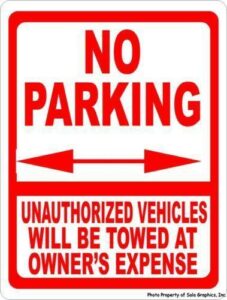BLOG
One of the most common problem areas for condominium associations and their property management is parking. Spaces are at a premium in most communities, and issues arise when unit owners and tenants fail to park in their designated spots. Associations and their property managers must be well prepared in order to effectively contend with parking violations.
Most condominium bylaws allow for the adoption of reasonable rules and regulations governing the use of the common elements, which typically include parking areas and spaces. Boards and management should determine whether the bylaws and/or rules are already adequately addressing parking in the community or if amendments to the governing documents and/or rules may be needed.
Some of the most typical issues addressed by parking rules are designated parking areas and spots for owners, guests and vendors, and spaces for commercial vehicles, boats on trailers, recreational vehicles, personal watercraft, campers, motorcycles and all-terrain vehicles. Some communities have restrictions on the number of vehicles that a unit owner is allowed to park onsite, and some have time limits for the parking of vehicles in certain areas.
 Bear in mind that all parking rules and restrictions must comply with the Fair Housing Accessibility Guidelines developed by the Department of Housing and Urban Development (HUD) with respect to designating handicap parking.
Bear in mind that all parking rules and restrictions must comply with the Fair Housing Accessibility Guidelines developed by the Department of Housing and Urban Development (HUD) with respect to designating handicap parking.
Once clear rules and restrictions are in place, condominium boards should develop effective enforcement measures, which will typically include warnings, fines (typically using a graduated scale that increases commensurately with each violation, but consistent with statutory constraints), and towing. The bylaws or rules pertaining to towing should allow for the association to assess the costs to the corresponding unit owner, and towing notices and requirements must strictly comply with Florida law.
If parking violations persist with wanton disregard by an owner, associations may seek injunctive relief through mandatory non-binding arbitration conducted by the Florida Department of Business and Professional Regulation, and/or by going to court. Injunction actions to enforce an association’s governing documents allow the prevailing party to recover their attorney’s fees and costs. If a unit owner continues to violate the parking rules after an injunction has been granted by the court, it is possible that the owner can be found to be in contempt of court.
Keep in mind that disabled unit owners may be able to request a reasonable accommodation related to parking that would enable them to deviate from some of the related rules and restrictions. Also, when there are not enough designated handicap parking spaces to accommodate all of the disabled owners, an association could be required to designate additional spots. Given the wide range of claims related to parking accommodations under the Fair Housing Act, associations should always consult with highly experienced legal counsel regarding each specific request to assess whether the accommodation is reasonable and should be granted.
Parking is a limited and valuable commodity in all condominium communities, and as such there will always be issues that arise. By carefully reviewing their bylaws, rules and enforcement measures to help ensure that they adequately address parking restrictions and violations, associations can help to minimize the potential disruptions that may be caused by parking issues.

